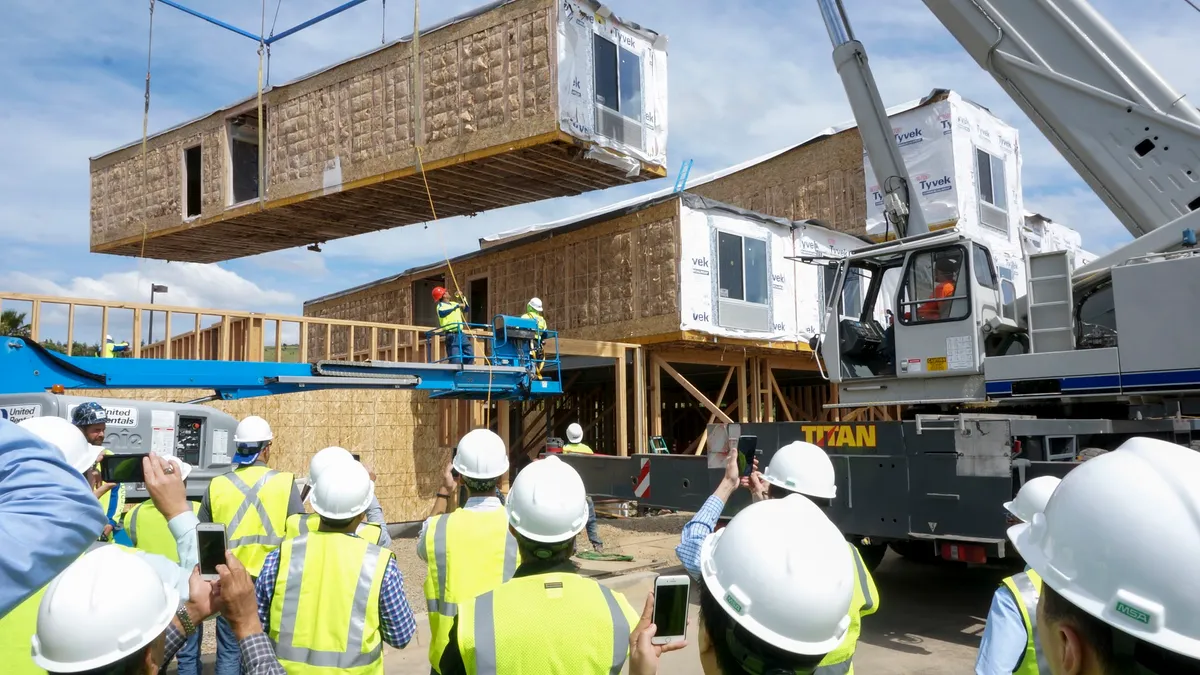This feature is a part of "The Dotted Line" series, which takes an in-depth look at the complex legal landscape of the construction industry. To view the entire series, click here.
Prefabrication in the commercial construction world is nothing new, Ron Ciotti, partner at law firm Hinckley Allen, told the Construction Super Conference in Las Vegas last month. Modular building has been around in various forms since the mid-1800s, but its big boom in recent years eclipses its long, steady history.
Technological advances have been making prefab manufacturing more feasible while market dynamics have been making it more imperative, he said. “We have a significant worker shortage, so companies are trying to figure out ways to be more efficient and more economical, and with less workers,” Ciotti said.
And for the diminishing pool of laborers available, the work needs to be more appealing, he continued, noting that prefab production environments are more inviting to newcomers, with “a climate-controlled factory setting away from the chaos of a typical jobsite where you might be hanging from the side of a building all day.”
Venture capital funding has also propelled the advancement of the building method and will continue to do so, he said. In all, prefabrication is only becoming more compelling and more inevitable.
The blurred line between manufacturing and subcontracting
But while there are many pros to prefab, there are uncertainties in the future as well, because despite its history, there are myriad legal aspects to the dynamic building method still being sorted out among industry and legal experts. Until then, the dotted line is sometimes a blurred line.
“We have all these advancements making [prefab] great, but it brings all these little challenges and potential pitfalls,” Ciotti said. “It creates all sorts of challenges from a legal standpoint.”
The rub? No one has quite figured out how a contractor undertaking prefab work should be defined. Are modular units goods? Is the work that involves putting the units together onsite a service? Since the modular builder is in charge, it must be determined whether what it does makes it a manufacturer, if it’s goods the company is providing, or a subcontractor, if it’s a service. The distinction creates very different rights and obligations, Ciotti explained.
“It brings up warranty obligations, statute of limitations, statute of repose issues, OSHA issues, labor issues and insurance and surety issues,” Ciotti said. “It brings up quality assurance issues, inspection issues, transportation issues, scope issues and more.”
Uniform Commercial Code, and in particular, Article 2, applies only to transactions of goods, attorney Scott Gurney reminded the audience of contractors, owners and lawyers. UCC defines goods as “all manufactured goods which are movable at the time of identification to the contract for sale.” UCC does not apply to contracts that are purely for services.
“That's the dichotomy,” he stressed. “Standard contract documents don’t cover modular building. So if it’s not UCC, does it fall under common law?”
It’s not so simple, Gurney, of Frost Brown Todd LLC, continued. “Modular construction transactions combine both goods and services,” thus bringing “legal implications concerning both UCC and common law,” which can make contracts tricky.
Canam Steel Corp. is exemplary of what happens in the in-between. Ron Peppe, vice president of legal services and human resources for the firm, has seen the lack of clarity play out over the years when it comes to contracts.
“[Canam] is the largest steel fabricator in North America, and we’ve worked on massive projects such as airports and the Atlanta Falcons stadium. We cut and mend and weld and fabricate metal offsite and ship it to the site and erect it onsite.” The projects are increasingly complex, he said, and the documents have not kept up, nor even changed much, during the 23 years he’s been involved. “We don’t really have a standard set of documents,” he said, so decisions are sometimes made more subjectively.
The prevailing view is that modular building is a provision of services, Gurney said, putting prefab businesses under the category of subcontractor. There have not yet been any court decisions applying UCC to modular construction, he went on, but “prior treatment of mobile homes, modular homes and prefabricated buildings create the possibility of a future shift toward the UCC view,” he said, which could represent big changes to contracts in the space.
Under common law, the speakers discussed, “a party to a construction contract does not materially breach if it performs its obligations in ‘substantial compliance’ with contract terms.” But under UCC, “if the goods or the tender of delivery fail in any respect to conform to the contact, the buyer may reject the whole, accept the whole, or accept particular units and reject the rest.”
“It’s a very complex process with lots of different trades involved, and if you don’t have the prime contract clauses flow down, it’s going to be a critical error on your part."

Ronald Ciotti
Lawyer and partner, Hinckley Allen
Prefab's legal pitfalls
Hence the pitfalls that Ciotti mentioned. Although things may change, currently, modular contractors are exposed to product liability, meaning they can be held accountable for a design defect, manufacturing defect or an information defect.
And that’s not all, Ciotti continued. If modular models are deemed the purview of subcontractors, they “may be impacted in a number of ways by state laws in the jurisdiction of an out-of-state manufacturer or subcontractor,” by dynamics such as statutes of limitation or repose, OSHA implications, licensing requirements, labor-related jurisdictional issues and more, making some projects “ripe for litigation.”
There’s also limited precedence and commentary as to whether modular or prefab contractors are bound by the terms of the prime contract, Ciotti added, noting that prefab subcontracts must be drafted to account for proper “flow-down” of prime contract terms and provisions — which Peppe said can be an issue at times for steel fabricators, for instance. Ciotti stressed that a contractor may need to preserve its rights through flow-down provisions.
“It’s a very complex process with lots of different trades involved, and if you don’t have the prime contract clauses flow down, it’s going to be a critical error on your part,” Ciotti explained. Contract provisions concerning liquidated damages and bonding requirements must be properly carried down to modular subcontractors as well, he continued.
There’s also the question of ownership of the materials and partially fabricated products at particular points of the process, especially if there are any cases of default. When do moveable goods incorporated into a construction project become real property? Ciotti asked this question hypothetically and stressed that it depends on many factors, but that it absolutely needs to be defined within the contract.
Quality assurance and quality control are other factors that pop up during the course of a modular project if they aren’t clearly defined in the contract, especially given right-to-enter and land possession issues. Is the owner or general contractor allowed access during fabrication?
Insurance is also a big question for these contracts, the lawyers pointed out. For builder's risk policies, the concern is whether coverage includes materials and manufactured products at the fabrication site; for owner-controlled insurance programs or contractor-controlled insurance programs policies (OCIP/CCIP), a project may not meet the threshold if substantial work is performed offsite. In regards to commercial general liability (CGL) policies, Ciotti said, the “theory is that the increased quality inherent in modular construction will result in fewer CGL claims resulting from defects and property damage.”
Lastly, Ciotti concluded, transportation comes into play in contracts for modular projects, as a huge component is represented by the transfer of goods from point A to point B. One part of that lies in the risk of loss or damage during transportation. “If module manufacturer is considered a UCC merchant selling goods, the risk of loss passes to the buyer upon receipt,” Ciotti explained. “But if the module manufacturer is not considered a merchant, but a subcontractor performing services, the risk of loss passes to buyer on tender of delivery.”
For all the variables that permeate a modular project, the speakers urged that control should come through careful contract drafting.
The Dotted Line series is brought to you by AIA Contract Documents®, a recognized leader in design and construction contracts. To learn more about their 200+ contracts, and to access free resources, visit their website here. AIA Contract Documents has no influence over Construction Dive's coverage within the articles, and content does not reflect the views or opinions of The American Institute of Architects, AIA Contract Documents or its employees.























